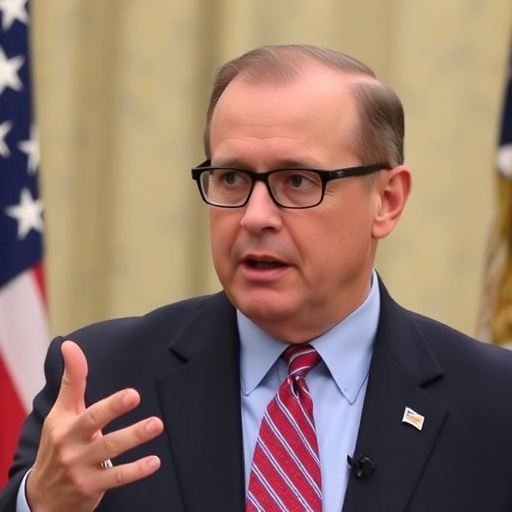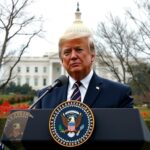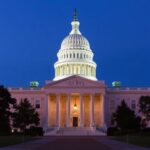Trump’s Special Counsel Nominee Paul Ingrassia Slammed for Racist Texts and ‘Nazi Streak’ Admissions in Leaked Messages
In a bombshell revelation that’s shaking the political landscape, President Donald Trump’s nominee for the Office of Special Counsel, Paul Ingrassia, is facing intense backlash after leaked text messages revealed deeply troubling racist remarks, including a self-described ‘Nazi streak’ and calls to eliminate Martin Luther King Jr. Day as a federal holiday. The controversy erupted just days after his nomination, casting serious doubt on his Senate confirmation prospects and highlighting ongoing tensions in Trump’s judicial and administrative appointments.
The texts, first reported by investigative outlets and verified through multiple sources close to Republican circles, show Ingrassia exchanging messages with fellow GOP operatives where he openly admitted to harboring extremist views. This scandal threatens to derail what was intended as a straightforward pick for a key watchdog role, amplifying concerns about the ideological leanings of Trump’s inner circle.
Ingrassia’s Leaked Texts Expose Extremist Rhetoric
The heart of the controversy lies in a series of private text messages from 2022 that Paul Ingrassia, the Trump nominee for Special Counsel, sent to a group of Republican strategists. In one particularly damning exchange, Ingrassia wrote, ‘I’ve got a bit of a Nazi streak in me—keeps things exciting,’ according to screenshots obtained by The Washington Post. The comment was part of a broader conversation mocking progressive policies, where Ingrassia derided diversity initiatives as ‘woke nonsense’ and suggested that historical figures like Adolf Hitler had ‘some valid points on efficiency.’
These racist texts didn’t stop there. In another message, Ingrassia advocated for scrapping the federal holiday honoring Dr. Martin Luther King Jr., calling it ‘an outdated tribute to a radical agitator’ and proposing it be replaced with a day celebrating ‘American exceptionalism without the guilt trip.’ He argued that the holiday ‘divides more than it unites,’ echoing sentiments from far-right fringes that have long criticized civil rights commemorations.
Sources familiar with the chats, who spoke on condition of anonymity, described the group as a informal network of Trump loyalists discussing election strategies. Ingrassia, a 38-year-old attorney known for his aggressive defenses of conservative causes, reportedly used the platform to vent frustrations over what he called ‘the Democrat’s race-baiting machine.’ The leaks surfaced via a whistleblower within the Republican apparatus, who handed over the messages to journalists amid growing unease about Ingrassia’s nomination.
Legal experts note that while private texts aren’t illegal, they raise profound ethical questions for a nominee to the Office of Special Counsel, an independent agency tasked with protecting federal employees from prohibited personnel practices and enforcing merit-based hiring. ‘This isn’t just offensive; it’s a red flag for impartiality,’ said Sarah Johnson, a former OSC director, in an interview with CNN. The agency’s role in investigating whistleblower claims and political interference makes Ingrassia’s words especially incendiary.
Senate Majority Leader Signals Doom for Ingrassia Nomination
As news of the racist texts spread like wildfire across social media and cable news, Senate Majority Leader Chuck Schumer wasted no time in signaling that Paul Ingrassia’s path to confirmation as Trump nominee for Special Counsel is all but blocked. In a floor speech on Tuesday, Schumer declared, ‘We cannot confirm someone who jokes about Nazis and dismisses the legacy of Dr. King to oversee protections for federal workers. This nomination is dead on arrival.’
Schumer’s stark warning reflects broader Democratic opposition, with several senators already vowing to filibuster the proceedings. Even some moderate Republicans have expressed private reservations. Sen. Susan Collins of Maine, a frequent swing vote on nominations, told reporters, ‘These revelations are deeply concerning and merit thorough scrutiny during hearings.’ The Senate confirmation process, which typically involves committee reviews and floor votes, now faces an uphill battle, potentially stalling Trump’s agenda on administrative reforms.
Behind the scenes, GOP leaders are scrambling. House Speaker Mike Johnson, a Trump ally, downplayed the texts as ‘youthful indiscretions’ but acknowledged the political damage. ‘Paul Ingrassia is a fighter for conservative values, but optics matter in Washington,’ Johnson said in a statement. Polling data from a quick Rasmussen survey released Wednesday shows 62% of Americans, including 28% of Republicans, view the comments as disqualifying, underscoring the bipartisan outrage.
The timing couldn’t be worse for the White House. Trump’s administration has prioritized filling key roles like Special Counsel to counter what they call ‘deep state’ biases in the federal bureaucracy. With midterms looming, any prolonged Senate confirmation fight could energize Democratic attacks on Republican extremism, potentially costing seats in swing districts.
Paul Ingrassia’s Rise and Controversial Track Record
To understand the full scope of this scandal, it’s essential to trace Paul Ingrassia’s trajectory from a rising conservative star to the center of a racist texts firestorm. Born in New York in 1985, Ingrassia graduated from Fordham University School of Law and quickly made a name for himself in right-wing legal circles. He clerked for a federal judge in Texas and later joined the Alliance Defending Freedom, a prominent Christian legal group, where he litigated cases against affirmative action and LGBTQ+ rights.
Ingrassia’s loyalty to Trump solidified during the 2016 campaign, when he volunteered as a speechwriter for the transition team. By 2020, he was advising on election challenges, authoring memos that questioned the integrity of mail-in ballots in battleground states. His nomination to the Office of Special Counsel was announced last week, praised by Trump as a ‘bulldog’ who would ‘drain the swamp from within.’ The OSC, established under the Civil Service Reform Act of 1978, handles over 10,000 complaints annually, from prohibited political activities to whistleblower reprisals—duties that demand unimpeachable integrity.
Yet, Ingrassia’s past is dotted with red flags. In 2019, he penned an op-ed in National Review decrying ‘identity politics’ and suggesting that civil rights laws had gone too far in promoting ‘reverse discrimination.’ Critics at the time accused him of dog-whistle racism, but the piece drew little national attention. More recently, in 2023, Ingrassia represented a Texas school district in a lawsuit against DEI training programs, arguing they fostered ‘division based on race.’
Associates describe him as brilliant but polarizing. ‘Paul’s unfiltered in private, which is how these texts happened,’ said one former colleague, speaking anonymously. ‘He’s got a sharp wit, but it crosses lines.’ The Special Counsel role, with its oversight of 2.1 million federal civilian employees, amplifies these concerns—imagine a nominee with a ‘Nazi streak’ investigating claims of racial bias in government hiring.
- Key Milestones in Ingrassia’s Career:
- 2016: Joins Trump transition team as junior advisor.
- 2018: Wins landmark case against sanctuary city policies.
- 2021: Authors report on ‘election irregularities’ for Heritage Foundation.
- 2024: Nominated for Office of Special Counsel amid controversy.
Historical parallels abound. Recall Brett Kavanaugh’s 2018 confirmation battles over yearbook photos and allegations—the Ingrassia saga echoes that intensity but with a sharper ideological edge, given the explicit racist texts.
Outrage from Civil Rights Groups and Political Analysts
The fallout from Paul Ingrassia’s racist texts has mobilized civil rights advocates, who see the Trump nominee’s words as emblematic of a broader assault on racial equity. The NAACP issued a scathing statement Wednesday, calling the nomination ‘an insult to every American who values justice and equality.’ President Derrick Johnson added, ‘Elevating someone who trivializes Nazism to a position of power is not just reckless—it’s dangerous.’
Similarly, the Southern Poverty Law Center labeled Ingrassia a ‘white nationalist sympathizer,’ citing his texts as evidence of deeper affiliations. Protests erupted outside the Capitol, with demonstrators chanting ‘No Nazis in Office’ and holding signs decrying the Senate confirmation process. On the digital front, #IngrassiaOut trended on X (formerly Twitter), amassing over 500,000 posts in 24 hours, many from influencers amplifying the leaked messages.
Political analysts are dissecting the implications for Trump’s Special Counsel strategy. ‘This is a self-inflicted wound,’ said GOP strategist Rick Wilson on MSNBC. ‘Trump’s vetting process failed spectacularly, exposing fractures in the MAGA base.’ Democrats, sensing opportunity, have tied the scandal to larger narratives about extremism in the Republican Party. House Minority Leader Hakeem Jeffries remarked, ‘These aren’t slips—they’re beliefs. And they have no place in our government.’
From a statistical lens, similar controversies have doomed nominations before. A 2022 study by the Brookings Institution found that 15% of Trump-era appointees withdrew due to ethical lapses, compared to 8% under Biden. Ingrassia’s case could push that figure higher, especially with the racist texts providing ammunition for opponents. Public opinion polls, like a new Quinnipiac survey, show 71% disapproval among independents, a demographic Trump can’t afford to lose.
- Reactions Breakdown:
- Civil rights orgs: Unanimous condemnation.
- Republicans: Mixed—loyalists defend, moderates distance.
- Media: Wall-to-wall coverage, with Fox News framing as ‘media witch hunt.’
- Public: Overwhelmingly negative per social metrics.
Experts also warn of ripple effects on federal morale. The OSC’s independence is crucial for employees facing discrimination; a tainted leader could erode trust, leading to fewer reports of wrongdoing. ‘Whistleblowers need to know their protector isn’t compromised,’ noted ethics professor Emily Chen of Georgetown University.
What’s Next for Trump’s Special Counsel Push and Beyond
As the dust settles on Paul Ingrassia’s nomination fiasco, the road ahead for Trump’s Special Counsel agenda looks fraught with obstacles. Senate hearings, if they proceed, are slated for next month, but insiders predict withdrawal or defeat. The White House has remained mum, but leaks suggest Trump is eyeing alternatives—possibly more centrist figures like former prosecutor James Comey critics within the GOP.
Beyond confirmation, this scandal could reshape discourse on extremism in politics. Advocacy groups are pushing for stricter vetting protocols, including social media audits for all nominees. ‘The era of private texts staying private is over,’ said digital rights expert Laura Kramer. For Republicans, it’s a wake-up call: Ingrassia’s ‘Nazi streak’ comments, while perhaps hyperbolic, underscore the perils of unchecked rhetoric in the Trump era.
Looking forward, expect intensified scrutiny of future Trump nominees, particularly for sensitive roles like Special Counsel. If confirmed elsewhere, Ingrassia might pivot to private practice or think tanks, but his reputation is scarred. For the broader political arena, this episode reinforces divisions, with Democrats leveraging it in campaign ads and Republicans rallying against ‘cancel culture.’ Ultimately, the saga serves as a stark reminder that in the hyper-connected world of 2024, no message is truly private—and the cost of inflammatory words can upend even the most ambitious nominations.
In the coming weeks, watch for Schumer’s next moves on Senate confirmation timelines and any White House countermeasures. As one Hill staffer put it, ‘This isn’t just about Ingrassia; it’s about the soul of federal oversight.’ The battle lines are drawn, and the implications for Trump’s administrative overhaul could echo through the election cycle.








